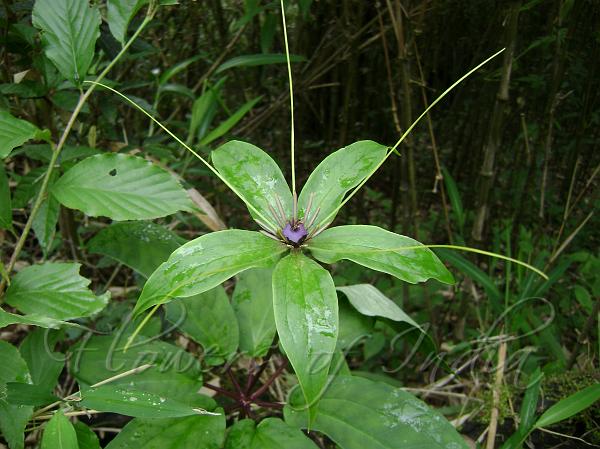|
| Himalayan Paris |
|

|

| File size | 1977987 |
| Original date | 5/19/07 3:01 PM |
| Resolution | 2592 x 1944 |
| Flash | Flash did not fire, auto |
| Focal length | 5.8mm |
| Exposure time | 1/60s |
| Aperture | 2.8 |
| Focus Distance | |
| Metering Mode | Multi-segment |
| Camera make | SONY |
| Camera model | DSC-S650 |
| Sensor type |
|
|
|
Photo: |
Botanical name: Paris polyphylla Family: Melanthiaceae (Bunchflower family)
Himalayan Paris is a much sought after beautiful and romantic plant with
amazing spidery flowers. The botanical name Paris means equal, and
polyphylla means many-leaved. Himalayan Paris is a creeping
rhizomatous forest plant with erect stem growing to 40 cm. It has 4-9 elliptic
leaves occuring in a whorl. Flowers occur single at the end of branches. The
flower has a ring of 4-6 green leaf-like perianth segments (which play the
role of speals/petals), which are 5-10 cm long. There is an inner ring of long
purple or yellow perianth segments which look like spider legs. Ten short
stamens are arranged again in a ring. Flowers are followed by a globular fruit
with scarlet seeds. Himalayan Paris is found in the Himalayas, from Pakistan
to W China, at altitudes of 2000-3000 m. Flowering: April-May.
Medicinal uses: Himalayan Paris is a folk medicinal plant in the Indian Himalayan Region,
traditionally used against analgesic, antibacterial, anti-
phlogistic, antispasmodic, antitussive, any poisonous bites,
burn, cut or injury, depurative, detoxification, diarrhea,
dressing, dysentery, febrifuge, fever, gastric, gastritis,
intestinal wounds, narcotic, poisoning, rashes or itching,
scabies, skin diseases, sleeplessness, snake bite, stomach
pain, typhoid, ulcer and wounds. It is a much sought after plant, making
it an endangered species becuase of over-exploitation.
Himalayan Paris is a folk medicinal plant in the Indian Himalayan Region,
traditionally used against analgesic, antibacterial, anti-
phlogistic, antispasmodic, antitussive, any poisonous bites,
burn, cut or injury, depurative, detoxification, diarrhea,
dressing, dysentery, febrifuge, fever, gastric, gastritis,
intestinal wounds, narcotic, poisoning, rashes or itching,
scabies, skin diseases, sleeplessness, snake bite, stomach
pain, typhoid, ulcer and wounds. It is a much sought after plant, making
it an endangered species becuase of over-exploitation.
Medicinal uses:
 Himalayan Paris is a folk medicinal plant in the Indian Himalayan Region,
traditionally used against analgesic, antibacterial, anti-
phlogistic, antispasmodic, antitussive, any poisonous bites,
burn, cut or injury, depurative, detoxification, diarrhea,
dressing, dysentery, febrifuge, fever, gastric, gastritis,
intestinal wounds, narcotic, poisoning, rashes or itching,
scabies, skin diseases, sleeplessness, snake bite, stomach
pain, typhoid, ulcer and wounds. It is a much sought after plant, making
it an endangered species becuase of over-exploitation.
Himalayan Paris is a folk medicinal plant in the Indian Himalayan Region,
traditionally used against analgesic, antibacterial, anti-
phlogistic, antispasmodic, antitussive, any poisonous bites,
burn, cut or injury, depurative, detoxification, diarrhea,
dressing, dysentery, febrifuge, fever, gastric, gastritis,
intestinal wounds, narcotic, poisoning, rashes or itching,
scabies, skin diseases, sleeplessness, snake bite, stomach
pain, typhoid, ulcer and wounds. It is a much sought after plant, making
it an endangered species becuase of over-exploitation.
| Identification credit: Tabish | Photographed on Shirui Hill, Ukhrul, Manipur, Arunachal Pradesh & Sikkim. |
• Is this flower misidentified? If yes,